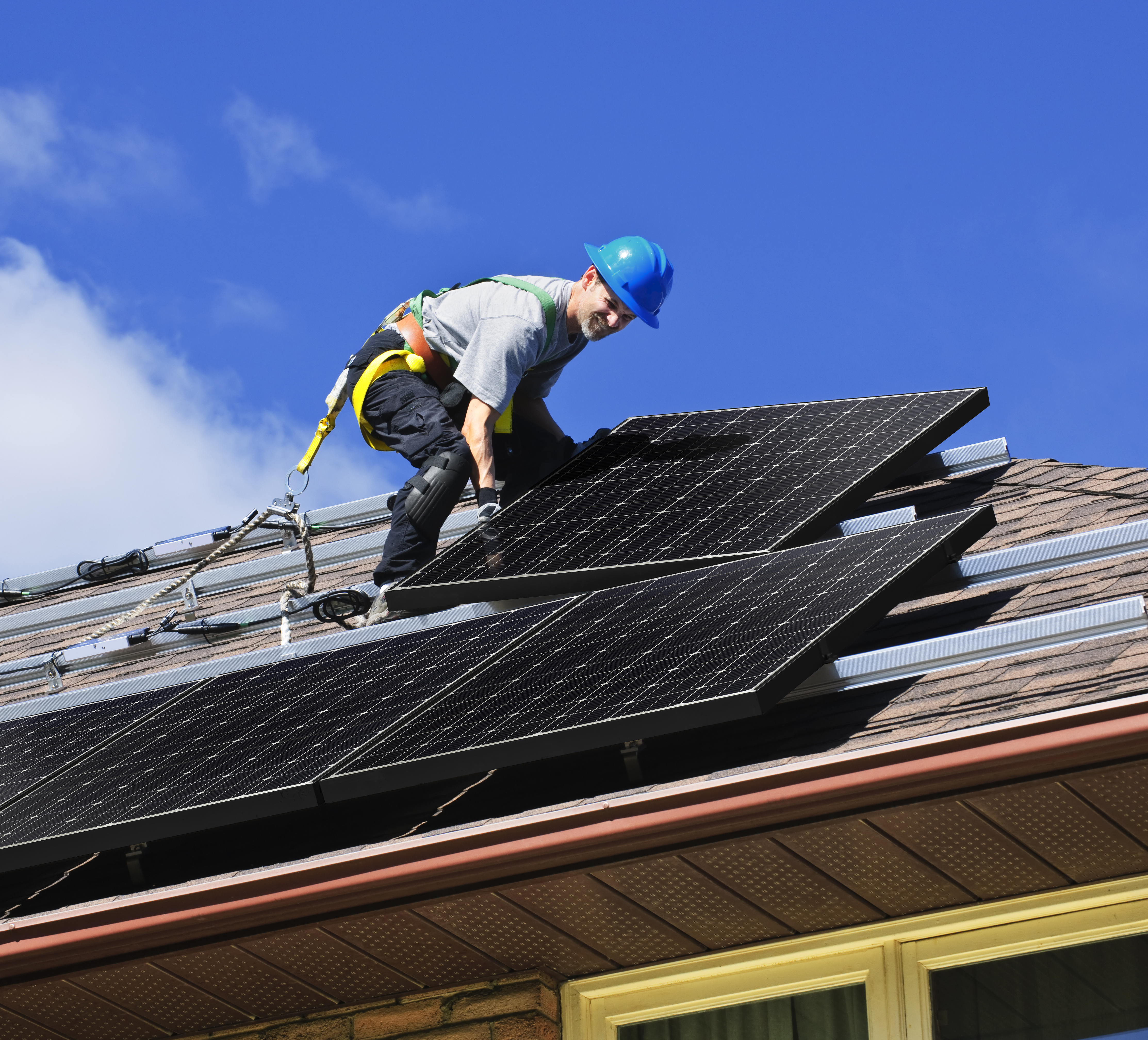Residential Solar Panels
To buy or not to buy
 The residential solar market has been steadily growing over the past few years, a trend that will continue in 2016. The solar industry, as a whole, saw the largest output of solar power to date in 2015, producing a 16 percent growth over 2014, according to the 2015 GreenTech Media report. The same report revealed that, for the fourth consecutive year, residential solar enjoyed over 50 percent annual growth. In years past, the residential solar industry was primarily driven by high-income states with favorable legislation regarding clean energy, states such as California and North Carolina. However, the number of states with annual solar productions over 20MW has increased threefold over the past four years, pointing to the continued growth of residential solar across the country. One trend that is primed for a surge in popularity is the outright ownership of residential solar systems, as opposed to third party ownership and other leasing options.
The residential solar market has been steadily growing over the past few years, a trend that will continue in 2016. The solar industry, as a whole, saw the largest output of solar power to date in 2015, producing a 16 percent growth over 2014, according to the 2015 GreenTech Media report. The same report revealed that, for the fourth consecutive year, residential solar enjoyed over 50 percent annual growth. In years past, the residential solar industry was primarily driven by high-income states with favorable legislation regarding clean energy, states such as California and North Carolina. However, the number of states with annual solar productions over 20MW has increased threefold over the past four years, pointing to the continued growth of residential solar across the country. One trend that is primed for a surge in popularity is the outright ownership of residential solar systems, as opposed to third party ownership and other leasing options.
There are several factors pointing to this movement, but this trend, like so many others, begins and ends with the consumer. The average solar customer today is much more educated on the solar business as a whole, as well as the particular type of solar system that they want for their home. Simply put, the customer is seeking to reduce their carbon footprint in a manner that makes the most financial sense for them.
More and more, residential solar customers are beginning to realize that owning the solar panels outright allows them to maximize their long-term savings despite the relatively high cost upfront. Also, loans for buying solar panels are easier to obtain and understand than they were in years past.
Last December, the Investment Tax Credit (ITC) was extended through 2021 which will result in more than 50 percent net growth in solar installations through 2016-2020. This new timeline will put worried consumers at ease, as legislation regarding the financials of the solar industry will remain constant at the federal level.
In the competitive residential solar business, there are several other important factors to consider when consumers purchase their own solar panels. Reliability is one of the main features that should appeal to consumers in their search for solar panels to install in their homes. People look for peace of mind with countless other long-term products, and that attitude should absolutely extend to their home solar system. Consumers don’t want to have to worry about replacing these solar panels once they are installed.
Similarly, residential solar panels should be viewed in the same lens as any other full-scale investment. Solar panels can provide huge savings over a 25+ year period, and should be looked at with the same mindset when considering a real estate or other longstanding investment. Owning a solar system is incredibly beneficial, not only for the environmental impact, but for the cost of energy as well, so the process of purchasing such a system should be taken with the utmost care. In this same vein, people are more inclined to choose well-known brands with an established track record in the solar industry. Consumers want to be familiar with the brand and company they are buying this investment from, and will seek out brands with good referrals and a solid history in the business.
Manufacturers now have to be more transparent with consumers about the solar systems they are selling, partly because of the increased level of education amongst consumers and also the rise in competition within the industry.
The increase in popularity of owning residential solar systems has also given rise to high-efficiency solar panels. These panels are more costly to purchase from the onset, but provide much greater savings over the long run. For consumers who may not have vast amounts of available roof space, these panels offer the best return on the dollar. High-efficiency panels often come with longer warranties as well, due to the importance placed on their longevity. These panels are built to perform in all kinds of weather conditions, and will make the most out of the limited space they are allotted. Purchasing solar panels from brands with a good, reputable track record and well-known technology are often safe choices.
In the constantly evolving renewable energy landscape, it is crucial consumers stay informed and aware of trends as new information hits the market. A solar system constantly reduces the energy bill of a home, without the interference of a third party, and is a huge boon to the homeowner’s long-term savings. Staying abreast of these new developments is imperative when making the decision to buy residential solar panels.
 Mukesh Sethi is the group manager and head of solar products group for Panasonic Eco Solutions Company of North America (PESNA), a unit company of Panasonic North America marketing and selling Eco products such as Ventilation Fans, Indoor Air Quality products, Power Tools and high efficiency Solar Panels. Mr. Sethi is charged with managing all aspects of Panasonic’s Solar Products division and expand the high efficiency solar panel business to the U.S. market. He joined Panasonic in March 2010. Prior to joining Panasonic, Mr. Sethi has worked in operations, planning and management for Avionics Company Thales Avionics and Sensient Technologies. Mr. Sethi holds a BS in Industrial Engineering and Masters in management from Rutgers University. He resides with his family in New Jersey.
Mukesh Sethi is the group manager and head of solar products group for Panasonic Eco Solutions Company of North America (PESNA), a unit company of Panasonic North America marketing and selling Eco products such as Ventilation Fans, Indoor Air Quality products, Power Tools and high efficiency Solar Panels. Mr. Sethi is charged with managing all aspects of Panasonic’s Solar Products division and expand the high efficiency solar panel business to the U.S. market. He joined Panasonic in March 2010. Prior to joining Panasonic, Mr. Sethi has worked in operations, planning and management for Avionics Company Thales Avionics and Sensient Technologies. Mr. Sethi holds a BS in Industrial Engineering and Masters in management from Rutgers University. He resides with his family in New Jersey.
Panasonic Eco Solutions | www.panasonic.net/ecosolutions
Volume: 2016 May/June









.gif?r=4180)

.jpg?r=9626)
.jpg?r=7851)